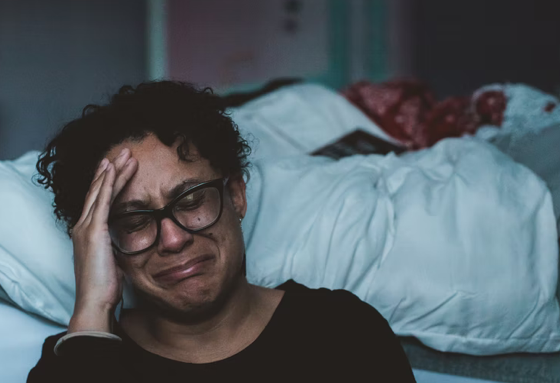 Stephen Geller Katz LCSW-R
Stephen Geller Katz LCSW-R
Misophonia Cognitive Retraining Therapy
 Stephen Geller Katz LCSW-R
Stephen Geller Katz LCSW-RMisophonia Cognitive Retraining Therapy
Misophonia Cognitive Retraining Therapy, as featured on the MTV True Life episode: “I Have Misophonia” premiering Friday, December 16th, 7:00 PM EST. See Clip >
|
|
|
| Moderate to severe anxiety triggered by chewing sounds, including: | ||
|
|
|
You may also be affected by visual stimuli, such as repetitive foot or body movements, fidgeting or movement you observe out of the corners of their eyes. Intense anxiety, rage and avoidant behavior may develop as a result of misophonia.
 * Do you feel your family and friends don’t understand how much you suffer?
* Do you feel your family and friends don’t understand how much you suffer?
* Do you often feel you can just suffer through a social event where there is eating present only to find that you must “escape” before you have a panic attack?
* Do you find that some people are at first understanding and make some efforts not to make the triggering sounds in front of you, but soon forget and constantly have to be reminded, causing you to feel angry, anxious and depressed?
* Are you avoiding social activities that you enjoy because of the misophonia?
* Are you fearful of losing your job and/or is the misophonia effecting your job performance?
You may be a candidate for Misophonia Cognitive Retraining Therapy, or MCRT.
Stephen Geller Katz, LCSW-R, with over 20 years of clinical experience, a New York University graduate, developed Misophonia Cognitive Retraining Therapy and founded Misophonia Cognitive Center™ in response to the growing number of people with Misophonia coming to his private practice from audiologists and ENTs. He discovered that by helping people to retrain and reinterpret the thoughts around their Misophonia, anxiety and depression symptoms began to improve. But even more important so did the Misophonic trigger response.
 What is the role of therapy for misophonia treatment? Misophonia, a condition characterized by strong emotional reactions to specific sounds, significantly affects individuals’ quality of life. Therapy plays a crucial role in the treatment of misophonia, offering strategies and tools to manage and mitigate symptoms. This blog explores various therapeutic approaches, their benefits, and how they can be integrated into a comprehensive treatment plan.
What is the role of therapy for misophonia treatment? Misophonia, a condition characterized by strong emotional reactions to specific sounds, significantly affects individuals’ quality of life. Therapy plays a crucial role in the treatment of misophonia, offering strategies and tools to manage and mitigate symptoms. This blog explores various therapeutic approaches, their benefits, and how they can be integrated into a comprehensive treatment plan.
Misophonia involves adverse reactions to everyday sounds such as chewing, tapping, or breathing. These sounds, known as triggers, can provoke intense emotional responses, including anger, anxiety, and the urge to flee the situation. The impact of misophonia on daily life can be profound, making effective treatment essential.
Cognitive Behavioral Therapy (CBT) is one of the most widely used therapeutic approaches for misophonia. CBT focuses on changing the negative thought patterns and behaviors associated with the condition.
CBT also involves exposure therapy, where individuals are gradually exposed to trigger sounds in a controlled environment. This exposure helps desensitize them to the sounds, reducing the severity of their reactions over time. Studies have shown that CBT can be highly effective in managing misophonia symptoms, improving overall emotional well-being.
Mindfulness-Based Stress Reduction (MBSR) is another therapeutic approach that can be beneficial for individuals with misophonia. MBSR combines mindfulness meditation and yoga to help individuals develop a greater awareness of their thoughts, feelings, and bodily sensations.
MBSR helps individuals with misophonia by promoting relaxation and reducing stress. Mindfulness techniques teach individuals to focus on the present moment and accept their experiences without judgment. This can reduce the intensity of emotional reactions to trigger sounds and improve overall coping mechanisms.
Practicing mindfulness can also enhance emotional regulation, making it easier for individuals to manage their responses to misophonia triggers. Regular mindfulness practice has been associated with decreased anxiety and improved mental health, making it a valuable tool in the treatment of misophonia.
Exposure therapy is a key component of both CBT and standalone treatment for misophonia. The goal of exposure therapy is to reduce the individual’s sensitivity to trigger sounds through gradual, controlled exposure.
Exposure therapy involves creating a hierarchy of trigger sounds, starting with those that cause the least distress. The individual is gradually exposed to these sounds while practicing relaxation techniques. Over time, the exposure is increased to include more distressing triggers. This process helps desensitize the individual to the sounds, reducing their emotional response.

A study published in the Journal of Anxiety Disorders found that exposure therapy can significantly reduce the severity of misophonia symptoms, leading to improved quality of life. You can read more about this study here: https://www.ncbi.nlm.nih.gov/pmc/articles/PMC10276561/.
Acceptance and Commitment Therapy (ACT) is another therapeutic approach that can be effective for managing misophonia. ACT encourages individuals to accept their experiences and commit to actions that align with their values.
ACT uses mindfulness and behavioral strategies to help individuals accept their misophonia triggers without attempting to control or avoid them. Instead of focusing on eliminating the triggers, ACT helps individuals live a meaningful life despite their condition. This approach can reduce the emotional impact of misophonia and improve overall well-being.
Therapy plays a vital role in the treatment of misophonia, offering various strategies to manage symptoms and improve quality of life. Cognitive Behavioral Therapy, Mindfulness-Based Stress Reduction, Exposure Therapy, and Acceptance and Commitment Therapy are all effective approaches that can be tailored to individual needs.
For personalized treatment, Dr. Stephen Katz (bio) at the Misophonia Cognitive Center™ offers specialized therapy services to help individuals manage misophonia effectively. Dr. Katz is an expert in CBT and other effective therapies for misophonia treatment.
MISOPHONIA COGNITIVE CENTER™
Stephen Geller Katz, LCSW
646-598-2251
• Convenient online sessions
• Dr. Katz is multi-lingual
For more information about Dr. Katz and his treatment services, visit https://www.misophoniacognitivecenter.com/.
Cognitive Behavioral Therapy (CBT) is a widely recognized and effective approach in the treatment of misophonia and various other psychological conditions. Misophonia, characterized by intense emotional reactions to specific sounds, such as chewing or tapping, can significantly impact an individual’s quality of life. Here, we explore how CBT can be an essential component of misophonia treatment.

CBT is a therapeutic approach that focuses on identifying and challenging negative thought patterns and behaviors. It is based on the idea that our thoughts and beliefs influence our emotions and behaviors. By addressing and altering these patterns, individuals can learn to manage their emotional responses more effectively.
When applied to misophonia, CBT aims to achieve several important goals:
CBT helps individuals recognize their specific misophonia triggers and understand the emotional reactions they experience in response to these triggers. This awareness is crucial for targeting treatment effectively.
CBT encourages individuals to examine and reframe their thoughts and beliefs about trigger sounds. This process can help reduce the intensity of emotional responses and create a more balanced perspective.
CBT equips individuals with practical coping strategies to manage misophonia symptoms. These strategies may include relaxation techniques, breathing exercises, and mindfulness practices.
Exposure therapy, a component of CBT, involves gradual and controlled exposure to trigger sounds. Over time, this exposure can reduce the emotional distress associated with these sounds.
CBT can teach stress management skills that are particularly beneficial for individuals with misophonia, as stress can exacerbate symptoms. Learning to manage stress can lead to more controlled emotional responses to trigger sounds.
CBT helps individuals build resilience and develop strategies for handling difficult situations involving trigger sounds. This can lead to increased confidence and improved overall well-being.
If you or someone you know is struggling with misophonia, seeking the guidance of a trained CBT therapist with expertise in misophonia treatment is essential. Stephen Geller Katz, a licensed clinical social worker and founder of the Misophonia Cognitive Center™, specializes in misophonia treatment and offers CBT as part of his comprehensive approach.
To explore the role of Cognitive Behavioral Therapy (CBT) in misophonia treatment and receive expert guidance on managing your misophonia symptoms, contact Stephen Geller Katz at the Misophonia Cognitive Center™. Dr. Katz offers online sessions and speaks five languages, making treatment accessible and effective.
MISOPHONIA COGNITIVE CENTER™
Stephen Geller Katz LCSW-R
19 West 34th Street
Penthouse Floor
New York, NY 10001
646-585-2251
How is cognitive behavioral therapy used in misophonia treatment? Misophonia is a condition that causes a strong emotional response to certain sounds, known as trigger sounds. This response can lead to feelings of anger, disgust, and anxiety, which can significantly impact daily life. While there is no cure for misophonia, there are effective treatments available. Cognitive Behavioral Therapy (CBT) is a type of talk therapy that can be helpful for managing misophonia symptoms. In this blog post, we will explore the role of CBT in misophonia treatment.

Cognitive Behavioral Therapy (CBT) is a form of talk therapy that focuses on identifying and changing negative thought patterns and behaviors. This type of therapy can be helpful for managing a range of mental health conditions, including anxiety disorders, depression, and post-traumatic stress disorder (PTSD).
In the context of misophonia, CBT can be helpful for managing trigger sounds and reducing the emotional impact of misophonia. By identifying negative thought patterns and behaviors associated with misophonia, individuals can learn to manage trigger sounds more effectively and reduce the emotional impact of misophonia on daily life.
CBT can play a crucial role in misophonia treatment, helping individuals manage trigger sounds and improve overall well-being. Some specific ways that CBT can be helpful for individuals with misophonia include:
 1. Identifying Trigger Sounds and Negative Thought Patterns
1. Identifying Trigger Sounds and Negative Thought PatternsIn CBT, individuals with misophonia can learn to identify trigger sounds and negative thought patterns associated with those sounds. By developing awareness of trigger sounds and the negative emotions they evoke, individuals can learn to manage those emotions more effectively.
CBT can help individuals develop coping strategies for managing trigger sounds and reducing the emotional impact of misophonia. Coping strategies may include deep breathing, progressive muscle relaxation, and positive self-talk.
CBT can help individuals challenge negative thoughts and behaviors associated with misophonia. By developing a more balanced perspective on trigger sounds and their emotional impact, individuals can reduce the intensity of their emotional reactions and improve overall well-being.
Misophonia can significantly impact daily life, but with effective treatment, individuals can learn to manage trigger sounds and reduce the emotional impact of misophonia. Cognitive Behavioral Therapy (CBT) is a type of talk therapy that can be helpful for managing misophonia symptoms, by identifying negative thought patterns and behaviors associated with misophonia, developing coping strategies, and challenging negative thoughts and behaviors.
If you or a loved one is struggling with misophonia, Cognitive Behavioral Therapy (CBT) sessions can be an effective treatment approach. Stephen Katz LCSW-R at the MISOPHONIA COGNITIVE CENTER™ has worked with this treatment method for over 15 years, and offers online CBT sessions that can help you manage trigger sounds and improve overall well-being.
Don’t let misophonia control your life. Contact Dr. Katz today at 646-585-2251 to learn more about our services and schedule an online session or consultation.
MISOPHONIA COGNITIVE CENTER™
Stephen Geller Katz LCSW-R
19 West 34th Street
Penthouse Floor
New York, NY 10001
646-585-2251
Many people these days are using cognitive behavioral therapy CBT for misophonia treatment. People who suffer from misophonia dislike certain sounds to the extent of having angry reactions to them. Eating and breathing sounds are common misophonia triggers, along with sighing, slurping, sucking, clearing throat, swallowing, smacking lips, yawning, etc. That said, the sound triggers in misophonia are different for most people.
Sure, any repetitive or patterned sound, particularly when avoiding it is difficult, can trigger people. However, when someone suffers from misophonia, they react emotionally to certain triggers, including rage, anger, disgust, and anxiety.
Besides exhibiting severe emotional reactions, people with this condition also have physical reactions, which include elevated heart rate and increased muscle tension. Many people with misophonia also develop various other mental illnesses like obsessive compulsive disorder.
There needs to be more research regarding the particular causes behind misophonia. However, one thing is for certain, and it’s that it isn’t recognized as a neurological or psychiatric illness. It means the condition doesn’t have proper diagnostic criteria so far.
Many believe that misophonia isn’t too much of a neurological condition. Instead, it is a psychiatric one. Hearing sensitivity tends to be quite common in individuals with this condition. Moreover, the way people with this disorder process certain sounds are also abnormal, possibly because of limbic excitation or an autonomic nervous system.
This terrible condition usually develops in kids during their early teenage years. One study suggested that people suffering from misophonia also had siblings and other family members with this condition. The study suggested that genetic causes and risk factors could be associated with this condition.
Unfortunately, misophonia doesn’t have a cure as of now. It could be because the condition is relatively new, and there needs to be more research. With more people learning about this disorder, there is a likelihood that scientists will work on finding a cure. That said, the absence of a cure doesn’t mean this condition is not treatable.
There are plenty of ways to treat misophonia, including cognitive behavioral therapy. This method has been the most effective for treating this condition. For those wondering, cognitive behavioral therapy is either conducted in groups or individually. Doctors usually gauge their patient’s condition to determine which option would suit them the most.
After that, they conduct short and long sessions to track their patient’s symptoms and look for patterns. Doing so helps the patients realize when they are most likely to exhibit signs of distress or anger, allowing them to focus on altering their behavior.
Cognitive behavioral therapy can last a few weeks to a few months, depending on the patient’s condition. Once doctors and their clients learn about certain patterns and triggers, they work on creating a plan to tackle misophonia correctly. It is worth keeping in mind that incorporating positive coping mechanisms and changes can take time. However, the results are worthwhile once you consistently work on them.
Treating misophonia is vital if you want your days to be stress free. When conditions like this get in your way, it is almost impossible to get anything done, and your life becomes full of hindrances. Stephen Katz Misophonia CBT Treatment can help you lighten this burden.
Contact us to book an appointment. We will prescribe you a suitable treatment for reducing your reactions to certain triggers. With our help, you will be able to enjoy life to the fullest by shifting your attention away from unpleasant sound triggers and focusing on positive thoughts.
Stephen Geller Katz LCSW-R
646-585-2251
Tele-Video Sessions
Speaks 5 languages
International Patients Welcome
What is misophonia retraining therapy? Due to the lack of extensive scientific studies and research, there is still a need to know more about Misophonia. It is a sound sensitivity disorder that refers to intolerance in response to certain sounds, i.e., trigger sounds. There are many cases where Misophonic people lash out at others when hearing misophonic trigger sounds. Misophonia patients can react negatively upon hearing even everyday triggers sounds like someone sniffing or snoring loudly. Their responses include psychological, social, and emotional reactions.

(Source)
It is common to misunderstand Misophonia for disorders such as tinnitus, OCD, depression, anxiety, and more. This is because the symptoms appear the same and may even correlate (lack of research). Other people might notice these trigger sounds as normal day-to-day noises. However, when it comes to Misophonic patients, they are intolerable to the slightest hint of these sounds. The severity of this condition varies from person to person. Therefore, reactions might not be as extreme in one person as they are in another.
Doctors and scientific researchers believe that there may be a way to cope with this condition through various behavioral and cognitive therapies. Here’s what the retraining therapy (TRT) for Misophonia looks like.
Tinnitus Retraining Therapy is a suitable treatment method to counter and help a patient cope with tinnitus. Tinnitus refers to ringing or buzzing in one or both ears and can be a frequent cause of the disturbance. However, the coping mechanisms of the TRT may be effective in dealing with the negative reactions and emotional responses that occur during Misophonia. Furthermore, it can help individuals to construct a relatively positive thinking pattern by ignoring any feelings of anger, disgust, irritation, annoyance, and so on.
TRT helps Misophonic patients to build tolerance against misophonic sound triggers. The primary focus will be on the ability of the individual to control their response against the trigger sounds that set them off. By listening without reacting negatively, they can redirect their thought process when it comes to auditory or visual stimuli of Misophonia triggers. TRT can be an alternative to CBT in some cases, which is also a very effective approach in treating Misophonia through therapy.

(Source)
Misophonia doesn’t entail a straightforward treatment procedure, unlike other mental health disorders such as PTSD, OCD, OCPD, and so on. It all comes down to the lack of research that restricts any advances in modern treatment and strategic development to help patients cope with Misophonia. Besides, experts and the official psychiatric board don’t classify Misophonia as an official psychiatric disorder with an official diagnosis. Altogether, the treatment scope for this condition remains limited.
Although the treatment duration and period will depend on the results, the main goal is to create a tolerance to the noises so they are not as disturbing. Tinnitus retraining therapy can potentially help to solve your Misophonia condition in three distinct ways. Here is the step-by-step process below.
The list of Misophonia triggers is long. In addition, some noises can be more exhausting and disturbing than others. The Misophonia triggers are not only auditory but also comprise visual stimuli. Here are some of the most common trigger sounds:
Do you want to benefit from retraining therapies to improve your Misophonia? Stephen Geller Katz LCSW-R at the Misophonia Cognitive Center™ can help you find a solution for your sound sensitivity.
Dr. Katz has over 20 years of clinical experience, and developed Misophonia Cognitive Retraining Therapy to treat and even completely cure patients with Misophonia!
He deploys a multi-disciplinary approach with individualized attention to every patient. If you are struggling with any such condition, it is best that you find other effective solutions to generate results and see improvement in your condition. Dr. Katz can help you with the right coping strategies and work your way to recovery.
Call today for a video consultation:
Stephen Geller Katz LCSW-R
19 West 34th Street
Penthouse Floor
New York, NY 10001
646-585-2251
Reference Links:
https://misophoniainstitute.org/tinnitus-retraining-therapy/
https://www.medicinenet.com/misophonia/article.htm
https://www.misophoniacognitivecenter.com/treatment-services/
https://www.tandfonline.com/doi/full/10.1586/14737175.2014.892418
What is cognitive behavioral therapy for misophonia? According to a 2021 study published by Depression and Anxiety, Jager and colleagues conducted a controlled trial to evaluate the results of misophonia with cognitive behavioral therapy. Their findings were remarkable and surprising. Before understanding the results of the study, let’s understand what cognitive-behavioral therapy is.

(Source)
Cognitive-behavioral therapy is an effective treatment for a wide range of psychological disorders. People with depression, marital problems, and anxiety found this treatment effective. Moreover, CBT is helpful for patients with drug dependency, severe mental issues, and eating disorders. Numerous studies suggest that CBT has remarkable effects to improve quality of life. The treatment improves the body’s functionality and reduces symptoms of mental illness. Studies also suggest that CBT is more effective than other psychological treatments and psychiatric medications.
After scientific evidence and research, experts claim that CBT is an effective treatment process that helps with many psychological problems. With the help of CBT, people suffering from mental diseases can cope with the symptoms and start a healthy life.
Misophonia is a mental condition wherein a patient can’t tolerate a certain sound. These sounds include sniffing, heavy breathing, sighing, and slurping. When a person suffering from misophonia hears the triggering sound, they lose control and show their aggression. They find the sound so irritating that it triggers their fight and flight response.
Misophonia symptoms are different from person to person. Some find chewing sounds more irritating than slurping sounds. Meanwhile, other finds both these sounds normal find the pen clicking sound triggering. Usually, the triggering sound for misophonia is repetitive that the patient can’t just ignore them.
People with misophonia develop a severe emotional reaction to the sound. They find the sound discomforting, anxious, and stressed. That is why they show aggression to stop that sound. The actual reason for this disorder is unknown due to a lack of research. But, many experts predict that misophonia can be a symptom of other underlying conditions that triggers their behavioral responses.
The symptoms of misophonia are mental as well as physical. For instance, a person during the triggering condition experiences increased heartbeat, slowed breathing, and excessive sweating. This indicates that there is something related to mental and physical reactors in the body.

(Source)
Now let’s return to the study and how it explains the importance of CBT for misophonia:
Experts recruited participants suffering from misophonia from the outpatient clinic. They diagnosed the patients with the condition and stated the diagnostic criteria. They used the same criteria that helped with proposing Schroder et al. The criteria include taking drugs while the psychiatrists consistently diagnosed the participants. They assess their level of depression, anxiety, and other bipolar diseases such as bipolar disorder, autism, and schizophrenia.
The program includes various activities such as stimulus manipulation, concentration exercises, and stimulus management. Furthermore, the team evaluates the arousal change, develops concentration, and learns a new technique to enjoy life to the fullest.
The study continued for about seven weeks, wherein they conducted psychomotor therapy and psychotherapy. After the study, the experts contacted the participants for a three-week follow-up session.
According to the primary outcomes, the patient started to reduce misophonia symptoms. Meanwhile, the secondary result focused on mental and physical conditions.
Are you suffering from misophonia and think that cognitive behavioral therapy may help? If yes, then you should consult with a specialist in this type of disorder. Stephen Geller Katz is one of the top specialists in the world treating patients to reduce the symptoms of misophonia.
For more information or an appointment, contact Dr. Katz today at 646-585-2251.
Cognitive Behavioral Therapy (CBT) is a popular treatment therapy option that doctors and experts employ for various conditions and psychological issues. This treatment approach shows potential and effectiveness similar to and sometimes more than other psychiatric and psychological therapies. Experts believe that effective CBT treatment can improve functionality and improve life quality.

(Source)
Clinical practices and research have given way to all the advances that improve the use of CBT as a treatment option for Misophonia. Since evidence and expert suggestions imply there is change through CBT in Misophonic patients, it is a popular option for behavior disturbances (like in Misophonia).
Before we dive into how CBT can help patients with Misophonia, let’s learn the basic facts about Misophonia. When a Misophonic patient hears a trigger sound or encounters visual stimuli that are irritating, annoying, or disturbing, they produce negative behavioral thinking patterns. These lead to negative reactions such as lashing out at the person making the noise or urgently fleeing the gathering, event, or place where the sound exists. Trigger sounds are everyday sounds and appear normal to other people.
However, Misophonia affected people perceive these sounds as disturbing and irritating. Some sounds include lip-smacking, sucking, slurping, yawning, heavy breathing, sniffing, chewing, and many more. These normal sounds can annoy a Misophonic person and result in anger and aggression. Overall, Misophonia trigger sounds and visuals are repetitive and patterned. Hence, they are hard to avoid. Apart from the emotional responses that the condition includes, there are physical responses as well. The latter include heart rate elevation, muscle tension, blood pressure spikes, etc.
This therapy is like talk therapy, where you work with a mental health expert and counselor. The main goal of this therapy is to involve the patient and help them realize how and why their negative thinking is inaccurate. This further helps in identifying the key challenges and, therefore, helps formulate effective coping and behavioral change strategies.
CBT has shown effectiveness in the treatment of a variety of different mental health problems. These include PTSD, eating disorders, depression, anxiety, and Misophonia reactions/responses. However, it is imperative to note that not everyone gets the same benefits through CBT treatment. Still, it can help Misophonia-affected people in dealing with stressful behavior, thinking, and reactions.
What happens in the CBT treatment? What’s the process to change and redirect the negative behavior and emotional response against Misophonia trigger sounds? It is the role of a therapist to inquire about what’s troubling you. In the case of Misophonia, they will ask you to talk freely regarding your feelings and emotions in response to trigger sounds and visual stimuli. You will have more confidence to share details with your therapist once you start discussing the experience and personal thoughts about your condition.
CBT involves a goal-oriented approach in which you may learn either on a regular session basis or periodically. The main focus will be on learning and practicing the techniques, ideas, and methodologies that you and your therapist explore together. The end suggestion of nearly every psychotherapist will include some form of positive encouragement to lead your life with minimal interferences. Of course, if successful, CBT will help you build tolerance and make it easy to ignore the trigger sounds more frequently and easily.
Additionally, your therapist can combine multiple forms of therapies in conjunction with CBT to help you regain control over your thought process and negative reaction processing in response to trigger sounds.

(Source)
CBT is not merely for the treatment of Misophonia. It helps treat and deal with a wide range of issues, and many psychotherapists use it. CBT helps to identify the causes and main challenges behind a particular mental health issue like Misophonia. This can be extremely helpful in formulating the right strategies on time. It follows a pre-set structure that your therapist will follow and guide you through the process. Here are some other emotional issues and challenges for which CBT is an effective tool:
Do you want to explore the treatments available for Misophonia in the medical industry? At the Misophonia Cognitive Center™, Dr. Katz LCSW-R can help you with your Misophonia condition using cognitive behavioral therapy. He possesses high-level experience in the field of psychotherapy and specializes in the treatment of Misophonia.
With effective treatment solutions, there may be scope for changes and improvements for your sound sensitivity disorder. Call 646-585-2251 to schedule a free online consultation with Stephen Geller Katz LCSW-R.
Reference Links:
https://www.researchgate.net/publication/257366235_A_brief_course_of_cognitive_behavioural_therapy_for_the_treatment_of_misophonia_A_case_example
https://www.psychologytoday.com/us/blog/noises/201807/is-cognitive-therapy-treatment-misophonia
https://www.psychologytoday.com/intl/blog/finding-new-home/202107/cbt-may-be-effective-treatment-misophonia
https://onlinelibrary.wiley.com/doi/10.1002/da.23127
Cognitive behavioral therapy is a highly effective treatment for Misophonia. This therapy challenges the individual who suffers from this disorder to change the way he perceives this mental disorder. Since no clinically approved procedure cures Misophonia, most patients resort to seeking Cognitive Behavioral Therapy or (CBT). This therapy requires commitment and dedication from a person, as it does not work overnight. It involves techniques that can stretch over a couple of months or sometimes years, depending on the progress.
The following are some of the cognitive behavioral therapy methods that can be useful in mitigating the emotional response of a person with Misophonia.
This a therapy in which a therapist will gradually expose a person with Misophonia to triggering sounds. This is a counter conditioning measure for desensitizing the person to the sounds. This provocative measure is useful when the therapist is simultaneously guiding the person on how to deal with this. It is important to have this exposure in small intervals of time so that the person exposed is not overwhelmed or startled.
This therapy involves hours of counseling from the therapist. The therapist attempts to talk to the person with misophonia to get the person aware of his condition. This awareness can help shift the negative thought patterns to positive ones that may emerge amid an emotional hijacking of the brain.

(source)
It involves a group of people who suffer from Misophonia to gather and interact with each other. A person who suffers from Misophonia tends to stay socially isolated and ignore any interaction. This is a very harmful practice. Group therapy allows people to interact and indulge in necessary socialization. It helps a person feel less socially isolated and allows them to experience the aspect of the community. This practice has many positive results in boosting the confidence of people with Misophonia. When these individuals relate to each other, the interaction becomes easier and more meaningful.
This training involves indulging people who have Misophonia in various activities. Activities usually involve some physical activity. When people participate in sports, it helps them refocus their attention on the tasks put in front of them. Such a refocus of attention, when practiced over time, can help divert their attention when they experience a trigger. Although it can be very hard to do and so this method does not make any promises. Engaging In activities that refocus attention can train the brain to be less susceptible to distracting to triggers like eating sounds or breathing sounds.
This method requires the help of a therapist, psychologist, or counselor. The main role in this method relies solely on the therapist to make the person uncover the secrets to his reactions. This method allows the person with the disorder to make discoveries about the triggers he faces. These discoveries may challenge some of the assumptions the person has made about his fears of triggering sounds. This method opens the person to new perspectives and thoughts. This process is not easy, as it demands the person to separate trigger sounds from emotions and look at them each distinctively without associating the two. This is a fight against the impulses and can be very tough for people who suffer from severe Misophonia.

(source)
It is important to note that Misophonia is an involuntary response. It is a reflexive emotion trigger to certain sounds particular to the person. Cognitive behavioral training helps in coping with the reactions to those triggers but not the triggers themselves. The trigger ranges from mild to high in different people, and the intensity may vary throughout their lives. These triggers will emerge in the presence of external stimuli (in this case, what the therapy can help you with is identifying the negative behavior patterns that follow those triggers.
CBT helps limit the emotional trauma that comes with this disorder. The complexities of the nervous system work in mysterious ways, and there has not been any deciphering of involuntary reflex actions. Cognitive Behavioral Therapy is still very useful for people who suffer from Misophonia and its effects on daily life. Yes, some people may see it as a way of masking the problem, but it works.
Cognitive behavioral therapy is crucial when dealing with post-traumatic injuries to your psyche after you face a trigger. It has a transformative effect on your personality. Once successful, it can help you live a happy life. Therapies like consultation and exposure can equip you to face the triggers better. Spreading awareness of this problem can result in more research on it.
If you have Misophonia symptoms or know anyone who does, visit us at the Misophonia Cognitive Center and schedule a tele-appointment.